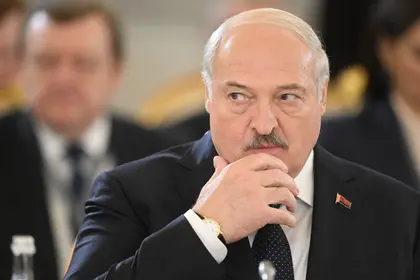Wearing a black beanie hat and glasses, Belarusian engineer Vladimir Labanov said he will cast his vote this weekend for the man that has led his Moscow-allied country since long before he was born: Alexander Lukashenko.
Labanov, 24, credits the autocrat – in power since 1994 – for keeping “order” in the reclusive state, believing that if 2020 mass protests had toppled Lukashenko, Belarus would have suffered the same fate as Ukraine.
JOIN US ON TELEGRAM
Follow our coverage of the war on the @Kyivpost_official.
Besides, he does not have much of a choice: the other little-known candidates have been picked to act as nothing more than paper opposition to Lukashenko, with the vote itself a mere formality to extend his 30-year rule.
“He has kept order in the country,” Labanov told AFP in central Minsk.
Sunday’s presidential vote is the first in Belarus since 2020, when tens of thousands protested against Lukashenko, demanding he stand down and accusing him of vote rigging.
The regime responded by arresting hundreds and forcing thousands into exile.
“In 2020, people did not understand so much... Our president showed which path we should take,” Labanov said.
“And slowly, people started to understand this.”
“And now, we have no war, like in Ukraine,” he said. “I think we would have had the same as in Ukraine” if the protests had been successful, he added.
It is a narrative that has been extensively used by Lukashenko, who in 2022 allowed his Russian ally, fellow autocrat Vladimir Putin, to use Belarusian territory to invade Ukraine.

Ukraine’s as the ‘Trump’ Card in the New Euro-Atlantic Order
All of Lukashenko’s opponents are in prison or in exile.
On the streets of Minsk, imposing Soviet-era buildings – covered in posters for the election with Lukashenko’s face – leave no doubt as to who will win.
Any form of criticism against Lukashenko is banned in Belarus.
Most people AFP spoke to on the streets of Minsk voiced support for him but still refused to give their surnames for security reasons.
‘Pillar’
“He has been our pillar for many years,” said 19-year-old Alina, a manager at the KFC fast food giant, which has remained in Belarus while exiting the market in neighboring Russia.
The West hit Belarus with sanctions after the 2020 crackdown on protestors, and increased them again following the Ukraine invasion.
Like many, Alina admitted “not knowing” the other four candidates. Their faces are almost entirely absent from the streets, while Lukashenko portraits adorn many public spaces in Belarus.
Those who tried to challenge him at the ballot in 2020 are held in prison, often incommunicado, or are in exile, like opposition leader Svetlana Tikhanovskaya.
On a gray winter day in Minsk, residents seemed mostly unbothered by the election with many unable to imagine their country without Lukashenko.
“I grew up under his rule and I saw the whole story. I believe in him,” said 39-year-old teacher Dmitry.
“As long as he has strength, Alexander Grigoryevich will govern the country,” he said, using Lukashenko’s name and patronymic.
Sanctions and repression
But Dmitry admitted that Western sanctions are “affecting families one way or another” and said he knew people who fled the country fearing repression by the KGB security agency, which has retained its feared Soviet-era name.
The economy in Belarus is largely planned by the state – with Lukashenko, a former collective farm boss, having shunned reforming swathes of the Soviet legacy.
Many Belarusians do not have access to European products, while rail and air links have also been cut, making Minsk even more reliant on Russia.
Others dismissed the economic difficulties.
“It’s not important,” said 74-year-old Sergei Kuznetsov, saying Minsk has found an alternative: “All our sales go to China.”
Antonina, also in her 70s, said she was supporting Lukashenko, who signed a decree to raise pensions a few days before the vote.
“It’s very good!”, she said, saying she receives around 300 euros ($315) a month.
For many in Minsk, the election will be just another weekend, with no surprises in sight.
“It’s been like this for centuries,” said Alina, smiling.
Since 1994, to be precise.
You can also highlight the text and press Ctrl + Enter










